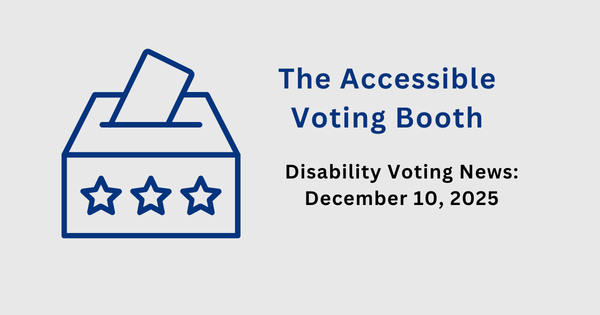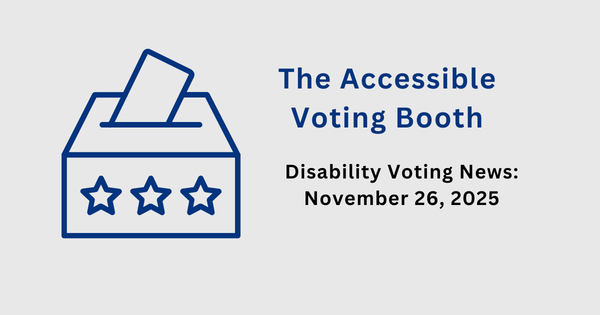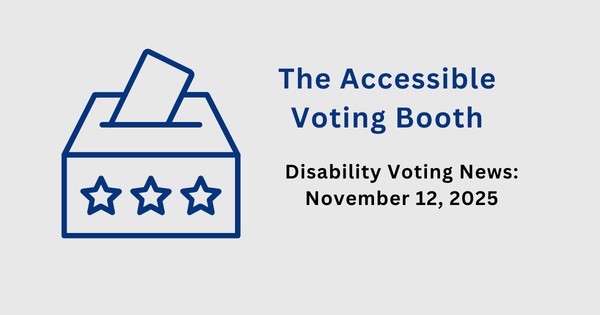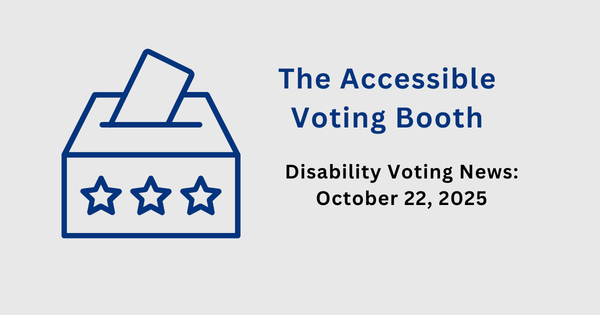Disability Voting News: October 1, 2025
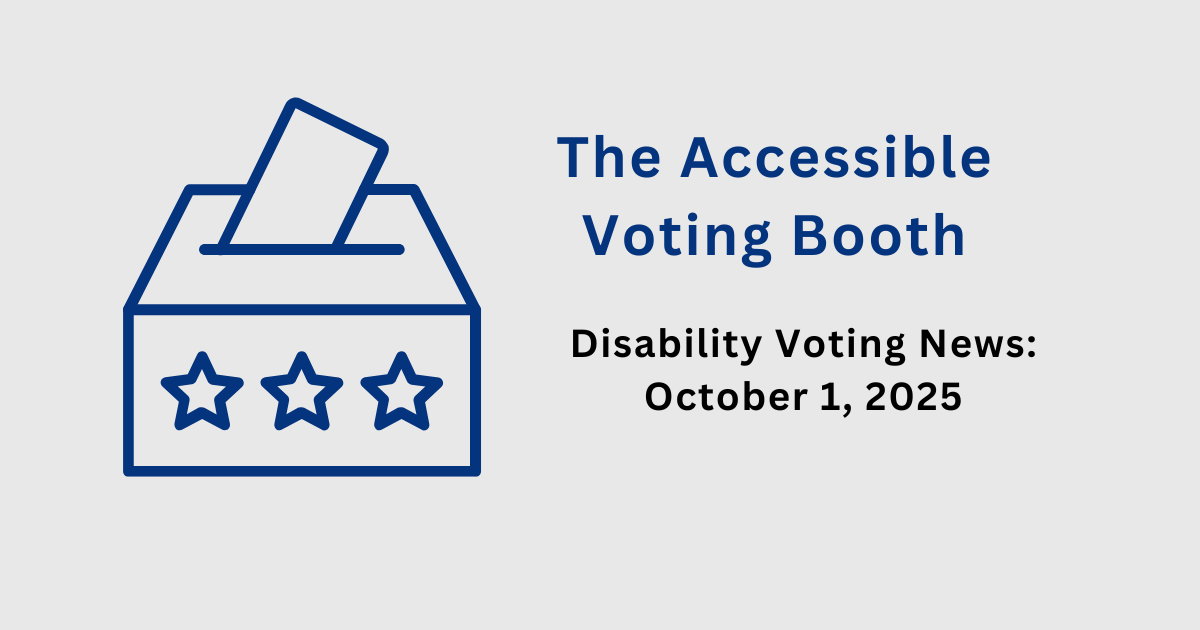
Welcome to the first Accessible Voting Booth of October 2025. Today, we’re discussing polling place accessibility grants in Michigan, voting accessibility in Maricopa County in Arizona, and updates out of Alabama on restrictions around voter assistance.
Just a quick note: the next issue of the Accessible Voting Booth will be three weeks from now instead of the regular two weeks. I’ll be back on October 22!
Caseville City and Caseville Township in Michigan receive $10,000 ADA grants to upgrade polling places for accessibility (via Huron Daily Tribune).
We’re starting with some positive news for once: Caseville Township and the City of Caseville were among townships awarded $10,000 grants by the Michigan Association of Municipal Clerks in a million-dollar initiative to help local governments improve accessibility. According to the Huron Daily Tribune, “these grants will cover ADA-compliant entry doors, electric door openers, and other improvements.”
This is the first I’ve heard of this initiative in Michigan, and it’s extremely welcome news. In my work with Detroit Disability Power to audit polling places in the Detroit Metro area, we know that polling place accessibility is an issue for the 30.4% of Michiganders who have a disability. While Caseville is not in the Detroit Metro area (and therefore not part of the DDP audit), the audit data provides useful information to help us understand how prevalent structural barriers are at polling places in Michigan. During their 2024 audit of 294 polling places, they found that 39% had access barriers at the doors of the polling place. These access barriers included heavy doors that did not have electric door opener buttons, as well as doors that had electric door opening buttons that were broken.
The DDP audit found many operational issues, from inadequate signage to doors propped open by large objects that obstructed paths, that can be fixed through poll worker training and low-cost solutions (such as buying small door stoppers). However, structural issues at polling places are often much more challenging issues for election officials to solve, as they often require more money to fix. These problems range from parking lots and sidewalks with cracked and broken pavement to noncompliant doorways. Election officials usually don’t have the budget for capital improvement projects, and for some locations like churches, they may not have the authority or ability to make permanent modifications to the polling place.
This grant program from the Michigan Association of Municipal Clerks is welcome news because it solves one of the biggest challenges in improving polling place accessibility by giving election officials the financial resources they need to fix structural barriers at polling places. This program should serve as a model for other state clerk associations to provide resources and support for improving polling place accessibility and ADA compliance.
Maricopa County voters with disabilities have better access, still see room for improvement (via KTAR News).
Local news in Arizona covered a recent disability voting rights event at Ability360 in Phoenix with the Maricopa County Elections office. Voter education events like this happen around the country when disability organizations partner with local elections offices to meet with the community and explain accessible voting options, and these events can give valuable insight into how accessible (or inaccessible) our voting systems really are.
In the article, several voters with disabilities are interviewed about their experience with accessible voting options. Sami McGinnis, who has low vision, used the accessible voting machine, which is offered to give voters who are blind or low vision nonvisual access to the ballot, as well as to make the ballot accessible to people with mobility disabilities. McGinnis was unable to operate the machine even with assistance from a county elections worker, as the machine’s audio directions moved too quickly and she had challenges with identifying which buttons to press (the machine at one point says to select the “red select button,” which is useless for someone who is unable to see color).
While accessible voting equipment is offered to ensure that voters with disabilities can vote privately and independently, we see that this equipment isn’t perfect and that there are still significant challenges with voting machines. It’s vital to continue research and development on accessible voting equipment to address these continued access barriers, and it’s equally vital to ensure that elections officials are provided the funding and ongoing support they need to upgrade, acquire, maintain, and operate accessible voting equipment. Additionally, this highlights the importance of training poll workers on how to operate the accessible voting device. The fact that McGinnis was unable to vote even with assistance from an election official is extremely concerning. Although this wasn't a real vote at a voter education event, if these problems aren’t fixed by the next election, then this voter will not be able to vote privately and independently.
Additionally, while elections officials in Maricopa County provide bipartisan teams to assist voters with registration and voting, voters must request this help at least seven days before the election. This puts an unnecessary administrative burden on voters with disabilities, as they have to anticipate their needs at least a week in advance of voting. Many voters who need assistance will not know that they need help until they go to vote and encounter a problem. Placing a deadline on requesting voter assistance a week in advance of voting means that many voters will not get the help they need.
I hope that the Maricopa County elections officials take the information and feedback from this event and use it to improve poll worker training on how to properly assist voters with disabilities, and to think through other ways to improve voting accessibility.
Court to decide if Alabama can ban paid help for absentee ballot voters with disabilities (via AL.com).
On Tuesday, September 17, the 11th U.S. Circuit Court of Appeals heard arguments regarding a portion of SB1, which makes it a felony punishable by up to 10 years in prison for a person to knowingly receive payment for “distributing, ordering, requesting, collecting, completing, prefilling, obtaining, or delivering” an absentee ballot application. Furthermore, a person who is convicted of knowingly paying or providing a gift to a “third party” doing this would be subject to up to 20 years in prison. Last year, this portion of SB 1 was struck down by U.S. District Judge R. David Proctor, who ruled that this portion of the law violates the federal Voting Rights Act, which allows voters with disabilities to be assisted by a person of their choice in filling out a ballot.
The Alabama attorney general’s office appealed the ruling, arguing that this language is included in the legislation to “protect paid political operatives from preying on vulnerable voters.” However, voting rights groups argue that this language could be used against home health aides and employees of disability programs who are paid staff and who provide assistance to people with disabilities. The state argues that the language does not put caretakers and aides at risk and that the law does not contradict Section 208 of the Voting Rights Act (which allows for assistance from a person of their choice for voters with disabilities.)
While the judges didn’t indicate how they would rule, their arguments prodded at whether the language of the law would expose support people to criminal liability:
U.S. Circuit Judge Britt C. Grant questioned: “I guess I don’t understand your argument,” she said. “If the person is a paid health care worker or paid aid, whatever, and the only reason that they’re there, receiving the instruction from the person they’re helping, is to help that person in whatever capacity, including filling out their application for an absentee ballot. Why are they not, as a matter of fact, receiving payment for doing exactly what the statute prohibits?”
U.S. Circuit Judge Robin S. Rosenbaum said the law puts caretakers, who are paid to aid potentially disabled voters, from aiding them in voting.
“It says it from the point of view of the person with the disability, who is blind or who is illiterate, but be the helper, it exposes all of them to criminal liability, up to 20 years in prison if they knowingly accept money in exchange for helping the person,” Rosenbaum said.
Anuja Thatte, who represents the plaintiffs who challenged SB1, has asked for a change in the statute that would exempt voters with disabilities who receive assistance from a paid support person and ensure that their right to receive assistance is protected.
As always, if you’d like to support the newsletter and my work, here’s how:
- Subscribe to the Accessible Voting Booth newsletter.
- Share this newsletter with your network to spread the word about disability voting rights.
- Leave me a tip. Thank you for supporting my work!

